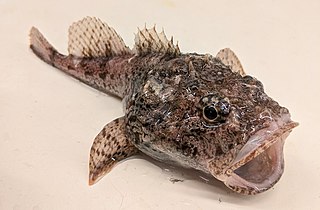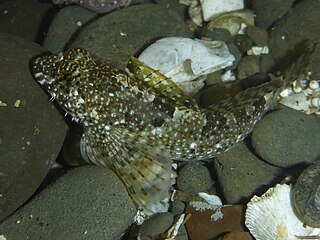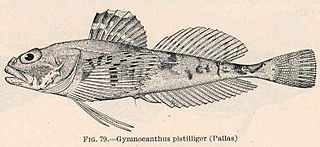
The snubnose sculpin is a species of marine ray-finned fish belonging to the family Cottidae, the typical sculpins. This fish is found in the eastern Pacific Ocean.

The Pacific staghorn sculpin is a species of marine ray-finned fish belonging to the family Cottidae, the typical sculpins. This species is found in the eastern Pacific Ocean. It is the only species in the monospecific genus Lepidocottus.

Clinocottus globiceps, the mosshead sculpin or globe-headed sculpin, is a species of marine ray-finned fish belonging to the family Cottidae, the typical sculpins. This sculpin is found in the northeastern Pacific.

Clinocottus is a genus of marine ray-finned fishes belonging to the family Cottidae, the typical sculpins. They are nearshore benthic fishes native to the northeastern Pacific Ocean. They are mentioned as sharpnose sculpins.

The roughback sculpin is a species of marine ray-finned fish belonging to the family Cottidae, the typical sculpins. This species is found in the eastern Pacific Ocean. The roughback sculpin is the only known member of the genus Chitonotus.
The lavender sculpin is a species of marine ray-finned fish belonging to the family Cottidae, the typical sculpins. It is found in the eastern Pacific Ocean.
The spineless sculpin is a species of marine ray-finned fish belonging to the family Cottidae, the typical sculpins. This species is found in the Pacific Ocean where it is endemic to the waters around the Aleutian Islands, Alaska.
Phasmatocottus is a monospecific genus of marine ray-finned fish belonging to the family Cottidae, the "typical" sculpins. The only species in the genus is Phasmatocottus ctenopterygius from the northwestern Pacific.
The hairhead sculpin is a species of marine ray-finned fish belonging to the family Cottidae, the typical sculpins. It is the only species in the monospecific genus Trichocottus.

The spinyhead sculpin is a species of marine ray-finned fish belonging to the family Psychrolutidae, the fatheads. This species is found in the northern Pacific Ocean. This species is the only species in the monospecific genus Dasycottus.

Enophrys bison, the buffalo sculpin, is a species of marine ray-finned fish, belonging to the family Cottidae, the typical sculpins. It is found in the eastern Pacific Ocean.

Myoxocephalus scorpioides, the Arctic sculpin or northern sculpin, is a species of marine ray-finned fish belonging to the family Cottidae, the typical sculpins. This fish is found in the Arctic Ocean.

Artedius corallinus, the coralline sculpin, is a species of marine ray-finned fish belonging to the family Cottidae, the typical sculpins. It is found in the eastern North Pacific along the coasts of the western United States and Baja California.

The woolly sculpin is a species of ray-finned marine fish belonging to the family Cottidae, or the typical sculpins. It is found in the eastern Pacific Ocean, where it occurs along the coastline of California south to Baja California.

The rosy sculpin is a species of marine ray-finned fish belonging to the family Cottidae, the typical sculpins. It inhabits the coastal northeastern Pacific Ocean, ranging from California (US) to Baja California.

The bald sculpin is a species of marine ray-finned fish belonging to the family Cottidae, the typical sculpins. It is found in the eastern Pacific Ocean.

Icelinus borealis, or the northern sculpin or comb sculpin, is a species of fish in the family Cottidae. It can be found in the northeastern Pacific Ocean along the western coast of North America.

Gymnocanthus pistilliger, the threaded sculpin, is a species of marine ray-finned fish belonging to the family Cottidae, the typical sculpins. This species occurs in the northern Pacific Ocean.

The Arctic staghorn sculpin is a species of marine ray-finned fish belonging to the family Cottidae, the typical sculpins. This sculpin is found in the Arctic Ocean and the northern Atlantic Ocean.

Clinocottus embryum, the calico sculpin or mossy sculpin, is a species of marine ray-finned fish belonging to the family Cottidae, the typical sculpins. It is found in the eastern Pacific Ocean.
















